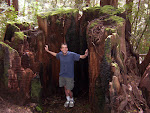source: Boston Globe
Why is it that really bad shit always has to happen before we get around to doing anything about the crooks and murderers in our midst. Is it greed? Fear? Laziness? I'm sick of people who say they can't afford 40 cents, or 50 cents, or 60 cents a day to make coal for electricity generation (90% of Appalachian coal is used to generate electricity) a thing of the past, to stop destroying the planet, to create good, safe, union jobs for these guys. Jobs building clean electricity supplies: improved efficiency, bio-gas, photovoltaics, super-flywheels, windmills -- local generation, local storage. Don't tell me we can't do it. We can. And clean renewables are a least cost solution. We're just too greedy, lazy, and afraid. And ignorant. Let's stop being those things for a while, and save our miner's lives, our own lives, our successors lives, and our planet. Stop believing the bullshit floated out there by liars who do nothing all day but protect their financial interests. Case in point, from "In Mine Safety, a Meek Watchdog":Bruce H. Watzman, senior vice president of the National Mining Association, the industry’s main lobbying group, said the industry was deeply committed to worker safety, estimating that it had spent more than $800 million since 2006 to enhance safety measures nationwide. He cautioned against quick adoption of new regulations, which might add cost, without addressing what actually caused the explosion at Upper Big Branch.
“It is understandable there is additional scrutiny and that some will call for immediate action,” Mr. Watzman said. “But we need good, complete answers as to what happened. And those are not necessarily quick answers.”I'd like this son of a bitch, along with Blankenship (Massey's CEO), to spend a few weeks in these mines. You can be damn sure there would be quick answers then.
And the miners and inspectors have had the answers for years, for ever:
“It’s always been my opinion that M.S.H.A. doesn’t use the powers it has,” said an inspector with more than 20 years of experience who did not want his name used because he was not authorized to speak to reporters.
Miners say that despite ubiquitous “safety first” slogans, they face relentless pressure to run more coal, as production is called.
“These big mine companies push the envelope to the breaking point,” said Mark Gray, a 51-year-old miner from Harlan.
Making routine methane checks, hanging ventilation curtains and shoveling dangerous accumulations of coal dust — all required under federal rules — take time away from production.
In most mines, foremen are judged almost exclusively by the productivity of their crew, said Mr. Brannon, the 30-year-old miner from Kentucky. “I’ve worked for bosses that wanted it done right, and most of the time they didn’t boss for too long,” he added.So read the whole article, and call your representatives, and your president, and tell them to fix our mines, and then fix our energy situation and create jobs people want and can hope to survive. Tell them it's worth 50 cents a day to you to prevent another 34 lives from being thrown away, to prevent what remains of middle class prosperity from being thrown away, to prevent Appalachia from being thrown away, to prevent the whole planet from being thrown away.



